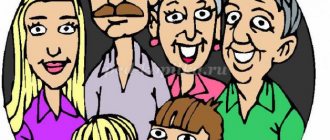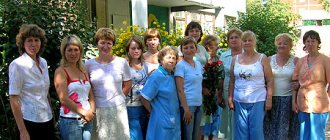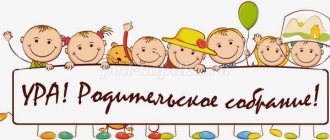Parent meeting in junior group 1 “This amazing early age”
Parent meeting in the 1st junior group “This amazing early age”
Target:
establishing contact between parents and teachers.
Tasks:
1. Summarize the adaptation period 2. Conduct a consultation: “A child aged 2 to 3 years - what is he like?” (memo on age characteristics of children 2-3 years old). 3. Arouse in parents the need for pedagogical knowledge.
Event plan:
1. Introductory part. Game-meeting with parents. 2. Determination by parents of the degree of adaptation of their child 3. Consultation: “a child aged 2 to 3 years - what is he like?” 4. Competition for parents for the best fairy tale for a child. 5. Teachers’ story “What we have already learned and how our day goes in kindergarten (video display). 6. Select a parent committee. 7. General questions.
Progress of the meeting.
Hello, dear parents! Today we have our first parent meeting, where we will meet and get to know each other better. Let's summarize the adaptation period, tell you - a child aged 2 to 3 years - what is he like? And about what we do and how our day goes in kindergarten.
Thank you for taking the time and coming to our meeting. I would really like to note that 5 families from our group brought a second child this year, and some brought a third child. Thank you for trusting us in raising your children.
Let's tell you a little about ourselves. We are teachers of the “Yagodki” group (story about ourselves). Our group, 1st junior group from 2-3 years old, where children undergo adaptation to preschool. They have been in our group for 1 year. Then they move to the second junior group, where new teachers will meet you and take you to school. The theme of the meeting is: “This amazing early age”
Let's find out what adaptation is
Adaptation is the adaptation or habituation of the body to a new environment. Every child sooner or later has to socialize, that is, become able to live among other people. The children's institution is the first to open the world of social and public life, where the child for the first time acquires the ability to interact with other children and adults. This is not the easiest period in your life and the life of your baby, but it is necessary for everyone. There are many changes happening in your baby’s life: a strict daily routine, the absence of parents for 9 or more hours, new requirements for behavior, constant contact with peers, a new room that hides a lot of unknowns, a different style of communication. All these changes hit the child at the same time, creating a stressful situation for him. These difficulties arise due to the fact that the baby moves from his familiar and usual family environment to the environment of a preschool institution. All children behave differently during this period: some cry inconsolably, others refuse to communicate with the children and the teacher, and others react quite calmly.
There are three degrees of severity of the adaptation period:
Now you will independently try to determine the degree of adaptation of your baby to the conditions of a preschool institution. Each of you has 3 circles (there are three boxes with circles of different colors on the tables) Green will mean a mild degree of adaptation, yellow - a medium degree, red - a severe degree of adaptation.
Signs of adaptation:
easy adaptation – the child is active, there are no external changes, changes in behavior are normalized within 1-2 weeks;
adaptation of moderate severity - throughout the entire period the mood may be unstable, there may be a lack of appetite, short-term restlessness of sleep. This period lasts 20 – 40 days.
severe adaptation – lasts from 2 to 6 months. The child gets sick, loses weight, and pathological habits appear: biting nails, thumb sucking, etc.
Please select the desired color circle. We invite you to compare your result with ours (pivot table). We can conclude that the adaptation of the children in our group was successful. You and I have dealt with this problem remarkably well.
A child aged 2 to 3 years – what is he like?
Children 2-3 years old have more mature and understandable personalities. Thanks to their endless observations, they became acquainted and became accustomed to the outside world, and developed their own type of relationships with adults. This age period still belongs to early childhood, but it is no longer worth considering a child as a helpless baby. He can do a lot, his circle of interests is expanding, so you need even more patience and attention to help him figure it out.
A child in the third year of life really grows by leaps and bounds: for him, every word spoken by an adult matters; every new knowledge he acquires shapes his inner world. This age is considered both the age of high achievements of the child and a difficult period of obstinate disobedience, associated with the fact that the child passionately seeks independence, trying to find himself in this huge, surprisingly interesting world. He expects an adult to directly participate in all his affairs and jointly solve any problem facing him. Your child's future talents and abilities will manifest themselves in years to come based on the foundation you lay now. Parents - the first teachers - introduce him to the world around him, give the child his first knowledge and skills. The leading role in the development of a child belongs to the family. You brought your children to kindergarten and we have the same goal to make their stay here comfortable, safe, interesting, exciting and educational. Only through the joint efforts of parents and kindergarten can we solve any problems.
But first we need to get to know each other better. To do this, you have emblems on your tables. Write your name on them and tell us whose parent you are and what has changed in your child since entering kindergarten.
Competition for parents for the best fairy tale for a child. (
Parents are given 5 minutes to write a short story. Then everyone reads out their fairy tale; at the end of the competition, all parents receive small prizes: notebooks and pens).
I invite you to play my fairy tale “Teddy Bear in Kindergarten”. (Distribution of roles: day, sun, two clouds, Mother Bear, Mishutka, a ray of sunshine, teacher, two or three children). (I read the text, parents role-play the described actions).
It was a warm summer day. The bright sun was shining, cheerful clouds were playing catch-up in the sky. A little mischievous ray of light looked into Mishutka’s nursery, stroked his head, his cheek, and then it tickled him! Mishka woke up, stretched, and then Mother Bear came: “Good morning, son!” Mom helped Mishutka put on the clothes she had prepared the night before, fed her a light breakfast and said that today Mishutka would have to go to kindergarten. The little bear knew what it was, his mother had been telling him about the kindergarten for a long time, they even went together to see where it was, walked on the playground with other children, so Misha was not particularly upset, on the contrary, he wanted to quickly get into this amazing, bright world. But as soon as Mishutka entered the kindergarten, he felt that his mother was worried, and some strange uneasy feeling came over him. The bear kissed Mishka, said that she would return soon, and then somehow very quickly disappeared. The baby was confused, he immediately wanted to cry, but then a very sweet and kind aunt came up to him. She invited him to see the toys and even allowed him to play with them. Mishutka was confused again. There were so many bright and beautiful toys on the shelves! And a new construction set, something Misha didn’t even have at home! And a wind-up little train, and many different cars, and also cubes, dishes... Mishka wanted to touch everything - everything. Strange kids walked around and distracted Mishutka a little, but the same auntie patted the baby on the head and gave him a lot of bright pencils and an album. How fun it was to draw the sun and grass and clouds in the sky with her! The rain began to cry outside the window. Misha, too, suddenly felt sad, and he also wanted to cry, but then the aunt took him in her arms, sat him on her lap and began to read a funny book. What colorful pictures there were in it, and how interestingly the dear aunt read, changed her voices, sang songs. It wasn't scary at all with her, it was even good. Mishutka liked her more and more, there were beautiful buttons on her blouse, and her auntie smiled all the time. “It turns out that this is the teacher, that’s what another aunt said, what a difficult word...” thought Mishka. It was easier for him to call her mom, especially since she is as good as mom. When thinking about her mother, tears welled up in Mishutka’s eyes. The teacher asked: “What are you doing, Mishenka?” and took him to wash his hands, and then sat him down at the table. How delicious the porridge turned out to be! Then there was absolutely no time to be bored. Together with all the children, the bear danced, built a long fence for the horse, then walked and swung on a swing. And all the time his second mother was nearby, helping him to climb, dismount, and stand up. Mishutka felt that he was tired. The teacher took everyone to the kindergarten to wash their hands. Then there was a very tasty lunch. And how I wanted to sleep! Immediately the teacher put Mishka in a soft crib and stroked him on the head. His eyes began to close on their own, and when Mishka woke up, his mother was already waiting for him at the door. And everything was fine, Mishutka thought that he would definitely come to his new home to play with his new friends. That's the end of the fairy tale! What talented actors are gathered here!
Let’s continue our conversation “What we have already learned.”
Next, we will tell you what we have already learned:
- all children know where their locker, towel, potty, crib is.
- learned some rules of behavior in the group.
- Almost all children eat on their own, with a little help from adults.
- learning to undress.
-learning to dress.
— learned to carry out basic tasks and put away toys.
As you can see, we have learned a lot, but we have even more to learn.
In our group, the educational process is built according to a schedule approved by the head. According to the program "Childhood". There are 10 classes per week. We invite you to familiarize yourself with the daily routine and schedule of educational activities at the stand for parents (you can bring documents with you). Every day there are 2 lessons of 10 minutes each. each. All classes are held in a playful way. During the day, various games are played (moving, didactic, story-based), finger games and nursery rhymes are learned, conversations are held with children, fairy tales are read, and dances are learned.
We invite you to watch a fragment of the video “These are the kids who came to kindergarten.”
Dear parents! To practice with didactic material, we need didactic games and manuals made with our own hands. To do this, We will need your help in making games throughout the year (displaying games). The kindergarten hosts various family creativity competitions, thematic exhibitions and photo exhibitions. Please take part in them! For fruitful work, we need to elect a parent committee.
General issues.
Parent meeting
A parent meeting in kindergarten is the main form of joint work between the teacher and parents, at which decisions are discussed and made on the most important issues of the life of the class community and the upbringing of children in kindergarten and at home. Parent meetings in kindergarten need to be held in different ways, alternating different forms, using creative ideas.
Parent meetings in kindergarten play an important role in establishing interaction between the teacher and parents, as well as between the parents themselves. This is a unique form of feedback, an opportunity to discuss upcoming plans for teaching and raising children in kindergarten and talk about the individual characteristics of children’s development. Teachers also invite specialized specialists to parent meetings: speech therapists, psychologists, methodologists, doctors.
In the section of the site, parent meetings in kindergarten for different age groups contain many interesting meetings for teachers on various topics:
- Summary of the parent meeting in the senior group “The role of parents in the labor education of children”
- Parent meeting in kindergarten on the topic “Formation of hard work in preschoolers” in the middle group
- Parent meeting in the second junior group “Let’s get to know each other”
- Parents' meeting in kindergarten "Daddy's Holiday" in the younger group
- Parent meeting in the senior group “Education and development of effective communication skills with children”
- Parent meeting in kindergarten on the topic “Towards new knowledge in the new school year!”
- Summary of the parent meeting in the middle group on the topic “Do you know your child”
- Outline of the parent meeting in kindergarten in the preparatory group “Health-saving technologies in our kindergarten”
- Parent meeting in the middle group at the beginning of the school year
- Summary of the parent meeting in kindergarten “Results of educational work”
- Parent meeting in kindergarten “Development of fine motor skills of the hands”
- Parent meeting in the first junior group of kindergarten “The role of toys in the lives of our children”
- Parent meeting “The Joy of Parenting” in kindergarten
- Parent meeting in the junior group of the kindergarten “The role of play in the development of preschoolers”
- Summary of a parent meeting at a preschool educational institution on the topic “The role of play in the development of preschool children”
- Parent meeting in kindergarten on the topic “Labor education of preschoolers” in the preparatory group
- First parent meeting of the school year in kindergarten
- Parent meeting in kindergarten “Your child is going to kindergarten”
- Summary of the parent meeting in the junior group of the kindergarten “The health of a preschooler is a common concern”
- General parent meeting of Federal State Educational Standards for Preschool Education in preschool educational institutions
- Parent meeting on the topic “What toys do your children need?”
- Parent meeting at a preschool educational institution on the topic “Children’s Rights”
- Parent meeting “The role of family reading in the development of a child’s personality”, in the senior group of a preschool educational institution using gaming technologies as a means of pedagogical competence
- Parents' meeting at the preschool educational institution "The Child and His Health"
- Parent meeting in kindergarten on the topic “Rules of behavior in kindergarten for big and small”
- Final parent meeting in kindergarten “So we have become a year older!”
- Plans for holding parent meetings on various topics
- How to effectively conduct a parent meeting in a preschool educational institution
- Preparing and holding a parent meeting
- Collection of methodological developments for parent meetings in kindergarten
- Parent meeting in a non-traditional form in kindergarten
- First parent meeting in kindergarten
- Scenarios for parent meetings in kindergarten, junior, middle, senior, preparatory groups
- Ways to conduct parent-teacher meetings in kindergarten
This section will help the teacher conduct interesting and effective parent-teacher meetings throughout the school year. Detailed meeting scripts will make the preparatory work easier for the teacher. Its main purpose is to harmonize, coordinate and integrate the efforts of the kindergarten and family in creating conditions for the development of a spiritually rich, morally pure and physically healthy child’s personality.
Parent meetings and participation in them are an integral part of the life of a preschool institution. Spontaneous and poorly organized parent-teacher meetings can cause nothing but mistrust and anxiety in moms and dads. Therefore, no matter what the content of the parent meeting, it requires careful preparation.
Parent meetings are one of the main forms of work with parents. It is not easy to successfully hold a parent meeting in a kindergarten, firstly, because it is necessary to ensure the attendance and activity of parents when they rush home, tired after work. Secondly, it is necessary to achieve the interest of parents, to convince them that participation in parent-teacher meetings will help them better understand their children and ensure their full development. The teacher should think about all this when preparing for the meeting.



